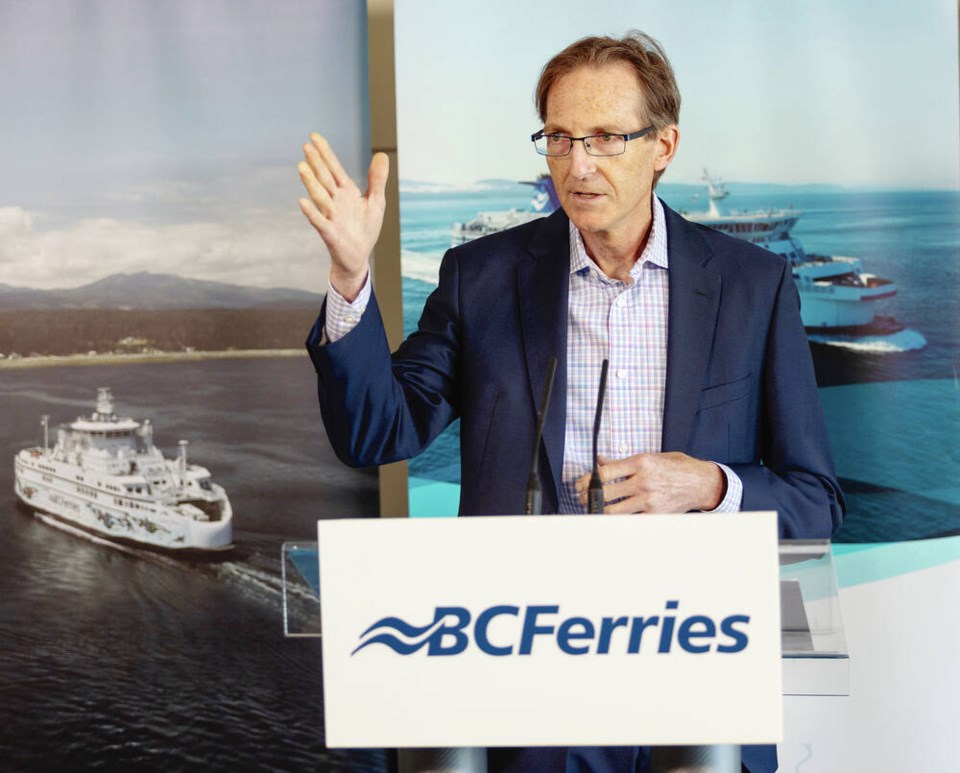Principles. Policies. Timing. Context. Optics. They all matter in politics.
Into this bouillabaisse we present to you today the curious case of the Chinese ferries. Every one of these political elements is now akimbo and susceptible to skepticism, criticism and cynicism.
In our new era of elbows-up, BC Ferries—and fairly or not, the David Eby NDP government by extension—is instead choosing a path of arms-embracing in selecting China Merchants Industry Weihai Shipyards to build (at cost unknown) four sleek ferries to modernize its tired fleet.
The principle involved here is the sudden desire to reduce our dependence on foreign goods and services, seemingly even when they are a better buy from a taxpayer perspective, in order to keep the money in Canada as we withstand whatever U.S. President Donald Trump will agree to in the weeks and months ahead as an acceptable ransom of our hostage-taking. It also matters as a principle that this involves a big-ticket outlay to China, a country we do not always attach to positively. The ferry deal fails this.
The policies involved are a buy-B.C., buy-Canada, red tape-reduced, prosperity-promising combination of diversifying trade away from America to build new alliances while providing greater opportunities in a mixture of protectionism, repatriation of economic opportunity and the production of new jobs to raise our moribund productivity as a country. The ferry deal fails this, too.
The timing involved concerns a Crown corporation that can’t win for losing and a premier who years into his term can’t find his feet on running the province’s economy. The ferry deal is, in many respects, the correct taxpayer choice of price-conscious procurement; a Canadian company didn’t even bid on the deal, after all. But it doesn’t help the BC NDP government, its unionized base of support or the British Columbian economy at a time it can use more of these minor megaprojects to feed government spendthriftiness. It shouldn’t go unnoticed that Eby is traipsing around Asia on the trade mission—everywhere, it seems, but China. The ferry deal fails this, as well.
The context involved is twofold.
First, the province’s finances are a mess and the economic prospects are the worst in the country, so when even an independent Crown corporation chooses to send capital to another country, it would be money ideally spent at home. (The material benefits to B.C. come much later in maintenance and refits.)
Second, the deal stands to contribute, fairly or not, to the early B.C. ambivalence about its participation in the new grand experiment Prime Minister Mark Carney has unfurled—the build, baby, build campaign. The province has already given the straight-arm to a new pipeline from Alberta across our terrain to the ocean to ship oil to customers not called the United States, under the pretension that the Trans Mountain pipeline is an adequate facsimile or somehow is well undercapacity; now it appears to be appeasing a country we don’t feel particularly warm about. The ferry deal fails on both accords.
Finally, the optics involved are obviously awful. Optics often are, notwithstanding the explanation from BC Ferries CEO Nicolas Jimenez—no Canadian bidder, an experienced and respected manufacturer, a concerted bid review process that scored the winner highly, and the best deal for the taxpayer. The deal fails and falls flat on its face on this.
One can only imagine the discussion Jimenez had with the government to break the news. By the time Transportation Minister Mike Farnworth expressed “disappointment,” I’d guess other parts of the vocabulary had been employed. To a casual observer, which most of us are on most things, the appearance is that this ought not to have been an economic opportunity that slipped into the cracks for British Columbia or Canada, considering we have shipbuilders in B.C. and in the east. But a ship is not a ship is not a ship. Like a lot of these decisions, it takes a lot to explain the rationale, and little to critique. Such is frequently the plight of leadership and its decisions.
If only this one didn’t collide with principles, policies, timing, context and optics—we’d be celebrating, finally, the eventual arrival of much-needed vehicles from a much-praised shipyard. But politics and public opinion are never easy to navigate, and the Eby government will wear this call, as we will see—if, indeed, the deal holds.
Kirk LaPointe is a Lodestar Media columnist with an extensive background in journalism. He is vice-president in the office of the chairman at Fulmer & Company.



